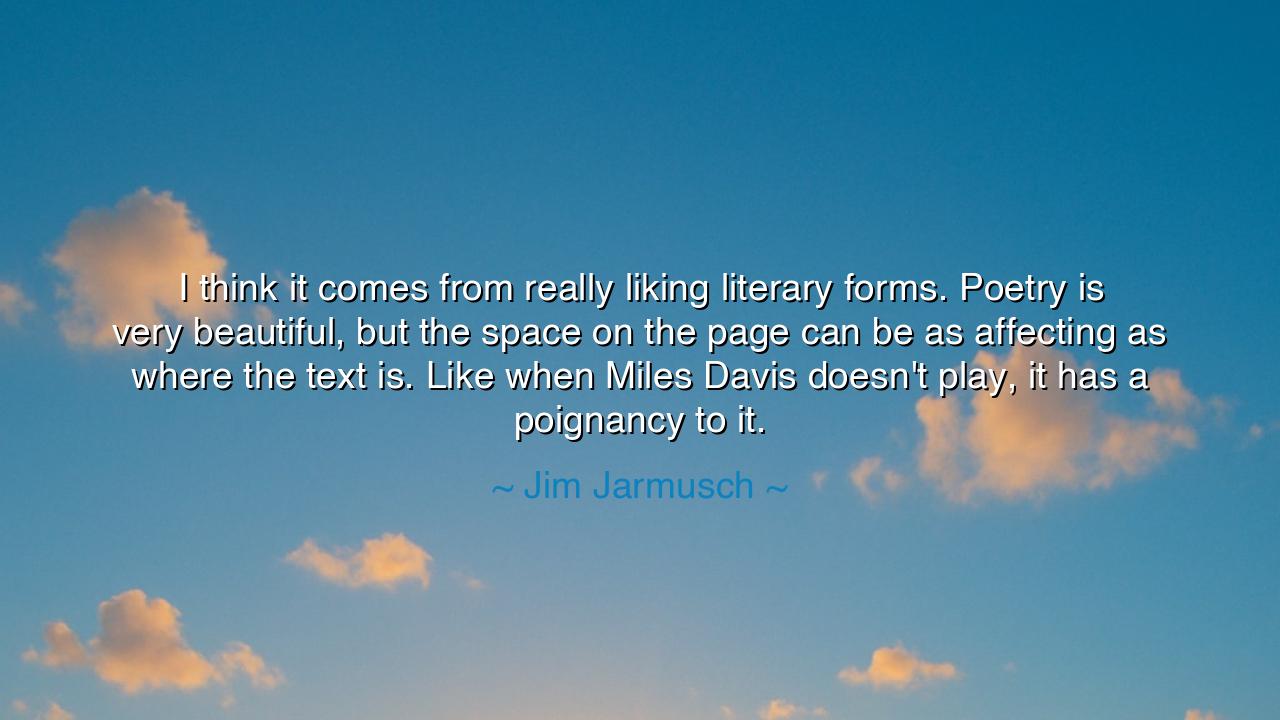
I think it comes from really liking literary forms. Poetry is
I think it comes from really liking literary forms. Poetry is very beautiful, but the space on the page can be as affecting as where the text is. Like when Miles Davis doesn't play, it has a poignancy to it.






In the world of art, whether in poetry, music, or any other form, there is a profound truth that transcends the mere presence of sound, words, or images. Jim Jarmusch, the master filmmaker and artist, reflects this truth when he says, “I think it comes from really liking literary forms. Poetry is very beautiful, but the space on the page can be as affecting as where the text is. Like when Miles Davis doesn’t play, it has a poignancy to it.” With these words, Jarmusch opens our eyes to a deeper dimension of creativity—a dimension where silence, absence, and the unspoken carry as much weight as the spoken word or the note played. It is a reminder that what is left out, the pauses between the beats, can often speak more loudly than the noise itself.
In the ancient traditions, this idea was understood deeply. The silence between the notes was as important as the notes themselves in the art of music, just as the space between the lines of poetry held as much significance as the words inscribed. The great Pythagoras, whose music theory laid the foundation for centuries of harmonic understanding, spoke not only of sound but also of silence, recognizing that harmony arises not just from the notes played, but from the spaces in between them. A musical scale is not simply a sequence of sounds, but a careful arrangement of both sound and silence, where each pause creates room for reflection, anticipation, and emotion. Jarmusch echoes this ancient wisdom in his reflection on Miles Davis, whose deliberate choice to leave space in his music created an emotional depth that no barrage of notes could have achieved.
Consider Miles Davis, the genius of jazz. His playing was not merely a display of virtuosity; it was an exercise in restraint. Davis understood that the most profound moments in his music came not when he played, but when he did not play. The silence between his notes, the moments of stillness, became the ground from which the most **powerful emotions






TN17. 7/5 Thuc Nghi
I’m curious about how poets and writers consciously manipulate page space. Are there historical or contemporary examples where layout and negative space enhance meaning, and how might this influence reading experience? I also wonder whether this approach challenges conventional notions of literary ‘completeness,’ suggesting that gaps, pauses, and empty spaces are integral to expression. Could this philosophy extend to other art forms, like film or visual arts, where absence or silence amplifies emotional resonance?
HHieu
I feel intrigued by the idea that the space on a page can evoke poignancy. Does this mean that minimalist or deliberately sparse poetry can be as emotionally resonant as densely packed verse? I also question whether readers universally perceive these silences, or if such effects rely on personal sensitivity and attentiveness. Could Jarmusch’s analogy to Miles Davis suggest that artistic restraint is a key factor in achieving depth, regardless of medium?
DTNgo Duc Tai
This makes me curious about the relationship between form and expression. How might the absence of text, like a musical pause, convey emotion or meaning that words alone cannot? Could this approach change how readers interact with poetry, making them more aware of rhythm, pacing, and timing? I also wonder if Jarmusch is highlighting a broader aesthetic principle that applies beyond literature and music—where what is omitted or left empty holds as much power as what is present.
NNguyennhattu
I find Jarmusch’s comparison between poetry and music fascinating. Could the use of space in writing function like silence in jazz, giving the reader room to feel and reflect? I wonder how intentional poets are in creating these pauses and how much the page layout contributes to emotional impact. Does this suggest that the visual aspect of poetry is as important as the words themselves, and can this principle apply to other literary forms, like prose or drama?